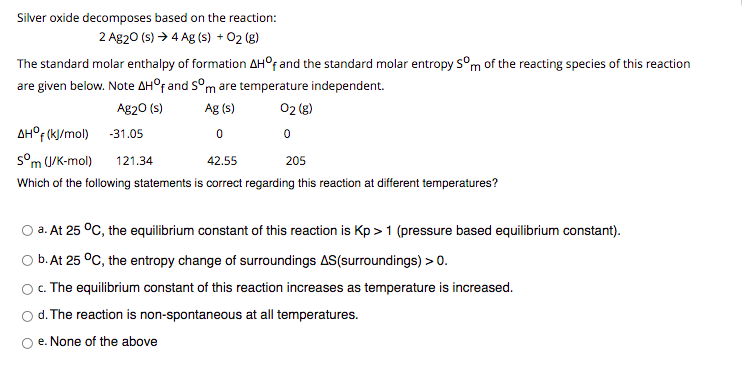Silver oxide decomposes based on the reaction: 2 Ag20 (s) → 4 Ag (s) + 02 (g) The standard molar enthalpy of formation AH°F and the standard molar entropy s°m of the reacting species of this reaction are given below. Note AH°fand s°m are temperature independent. Ag20 (s) Ag (s) 02 (8) AH°F (k/mol) -31.05 s°m U/K-mol) 121.34 42.55 205 Which of the following statements is correct regarding this reaction at different temperatures? O a. At 25 °C, the equilibrium constant of this reaction is Kp >1 (pressure based equilibrium constant). O b. At 25 °C, the entropy change of surroundings AS(surroundings) > 0. O. The equilibrium constant of this reaction increases as temperature is increased. d. The reaction is non-spontaneous at all temperatures. e. None of the above
Silver oxide decomposes based on the reaction: 2 Ag20 (s) → 4 Ag (s) + 02 (g) The standard molar enthalpy of formation AH°F and the standard molar entropy s°m of the reacting species of this reaction are given below. Note AH°fand s°m are temperature independent. Ag20 (s) Ag (s) 02 (8) AH°F (k/mol) -31.05 s°m U/K-mol) 121.34 42.55 205 Which of the following statements is correct regarding this reaction at different temperatures? O a. At 25 °C, the equilibrium constant of this reaction is Kp >1 (pressure based equilibrium constant). O b. At 25 °C, the entropy change of surroundings AS(surroundings) > 0. O. The equilibrium constant of this reaction increases as temperature is increased. d. The reaction is non-spontaneous at all temperatures. e. None of the above
Chemistry & Chemical Reactivity
9th Edition
ISBN:9781133949640
Author:John C. Kotz, Paul M. Treichel, John Townsend, David Treichel
Publisher:John C. Kotz, Paul M. Treichel, John Townsend, David Treichel
Chapter18: Principles Of Chemical Reactivity: Entropy And Free Energy
Section: Chapter Questions
Problem 32PS
Related questions
Question
100%

Transcribed Image Text:Silver oxide decomposes based on the reaction:
2 Ag20 (s) > 4 Ag (s) + 02 (g)
The standard molar enthalpy of formation AH°F and the standard molar entropy s°m of the reacting species of this reaction
are given below. Note AH°F and s°m are temperature independent.
Ag20 (s)
Ag (s)
02 (g)
AH°F (kJ/mol) -31.05
s°m U/K-mol)
121.34
42.55
205
Which of the following statements is correct regarding this reaction at different temperatures?
O a. At 25 °C, the equilibrium constant of this reaction is Kp >1 (pressure based equilibrium constant).
O b. At 25 °C, the entropy change of surroundings AS(surroundings) > 0.
O. The equilibrium constant of this reaction increases as temperature is increased.
O d. The reaction is non-spontaneous at all temperatures.
e. None of the above
Expert Solution
This question has been solved!
Explore an expertly crafted, step-by-step solution for a thorough understanding of key concepts.
This is a popular solution!
Trending now
This is a popular solution!
Step by step
Solved in 3 steps with 3 images

Knowledge Booster
Learn more about
Need a deep-dive on the concept behind this application? Look no further. Learn more about this topic, chemistry and related others by exploring similar questions and additional content below.Recommended textbooks for you

Chemistry & Chemical Reactivity
Chemistry
ISBN:
9781133949640
Author:
John C. Kotz, Paul M. Treichel, John Townsend, David Treichel
Publisher:
Cengage Learning

Chemistry & Chemical Reactivity
Chemistry
ISBN:
9781337399074
Author:
John C. Kotz, Paul M. Treichel, John Townsend, David Treichel
Publisher:
Cengage Learning

Chemistry: The Molecular Science
Chemistry
ISBN:
9781285199047
Author:
John W. Moore, Conrad L. Stanitski
Publisher:
Cengage Learning

Chemistry & Chemical Reactivity
Chemistry
ISBN:
9781133949640
Author:
John C. Kotz, Paul M. Treichel, John Townsend, David Treichel
Publisher:
Cengage Learning

Chemistry & Chemical Reactivity
Chemistry
ISBN:
9781337399074
Author:
John C. Kotz, Paul M. Treichel, John Townsend, David Treichel
Publisher:
Cengage Learning

Chemistry: The Molecular Science
Chemistry
ISBN:
9781285199047
Author:
John W. Moore, Conrad L. Stanitski
Publisher:
Cengage Learning

Chemistry: Principles and Practice
Chemistry
ISBN:
9780534420123
Author:
Daniel L. Reger, Scott R. Goode, David W. Ball, Edward Mercer
Publisher:
Cengage Learning

Chemistry: An Atoms First Approach
Chemistry
ISBN:
9781305079243
Author:
Steven S. Zumdahl, Susan A. Zumdahl
Publisher:
Cengage Learning

Chemistry
Chemistry
ISBN:
9781305957404
Author:
Steven S. Zumdahl, Susan A. Zumdahl, Donald J. DeCoste
Publisher:
Cengage Learning